The Joint Expeditionary Force (JEF) is a military alliance formed by the United Kingdom and nine other countries in Northern Europe, focused on rapid political-military response to humanitarian crises and wars.
Since 2021, the JEF has been operating maritime, land and military training exercises for hybrid attacks, providing moral and weapons support to Ukraine in the conflict against Russia by responding to a direct request for help from Ukrainian President Zelensky.
As part of the quest for more autonomy in European security, the JEF and its speed in military responses may change Europe’s relationship with conflict, facilitating and providing support to NATO.
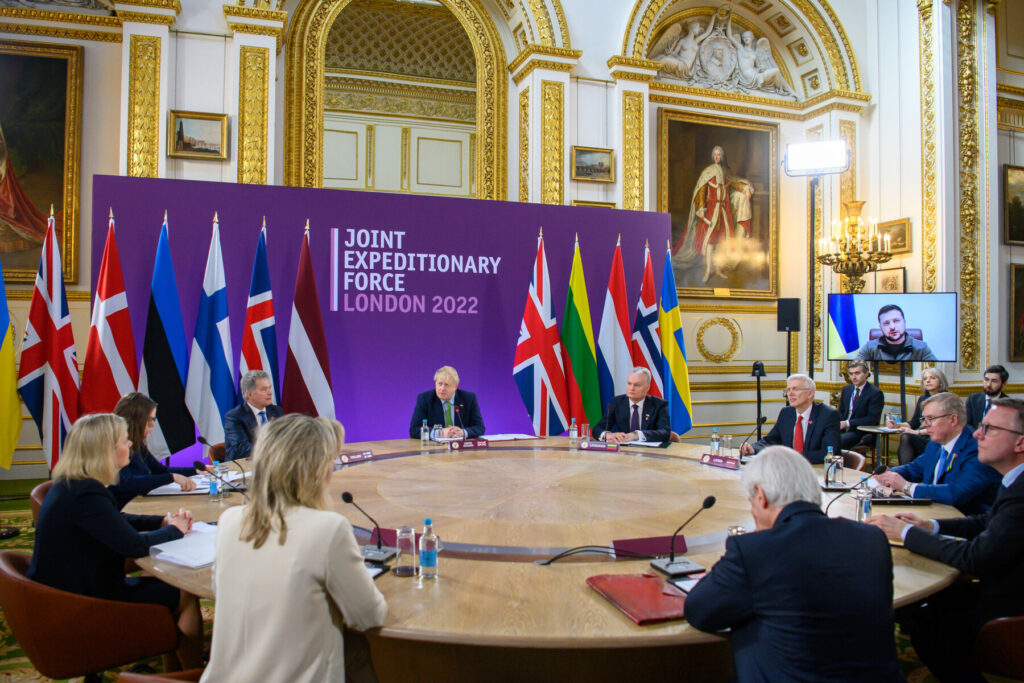
What is the UK Joint Expeditionary Force (JEF)
Created in 2012, the Joint Expeditionary Force signed an agreement with 7 countries initially, but already has 10 Northern European countries led by the United Kingdom, active since 2018.
With the participation of Denmark, Estonia, Finland, Iceland, Latvia, Lithuania, the Netherlands, Norway, Sweden and the United Kingdom, JEF aims to join Northern Europe, the North Atlantic and the Baltic countries in a joint international military exploratory force.
First participation in the BALTOPS 2019 exercise, led by the United States and NATO. Since then, in 2021, they conducted two further maritime exercises in Baltic Sea and in Sweden.
Its difference for multinational defense organizations, such as NATO, is that it does not depend on approval among all members to take military action, without the need for everyone to participate in all expeditions. That is, the United Kingdom can engage in a military conflict with the participation of only one or more members of the JEF.
In addition, each nation can provide military capabilities and expertises according to crisis needs, no specific obligation regarding the military supply beyond the need to invest more than 2% of the GDP of their nations in the Joint Expeditionary.
This more flexible feature of the JEF compared to the articles of mutual defense of NATO allows them to act more quickly in a crisis situation, without going through the bureaucracies of approval among more than 30 different nations. As placed by the commander of the 3rd Command Brigade and head of JEF ground forces, Matt Jackson, for the USNI News: “the JEF can act while NATO is still thinking.”
Why the UK saw the need to promote greater military political cooperation with other European countries
With the goal of becoming a military center, mainly post-Brexit, the United Kingdom formulated a framework of nations (considered “small” nations) that were already allied or possessed relations, including non-NATO allies.
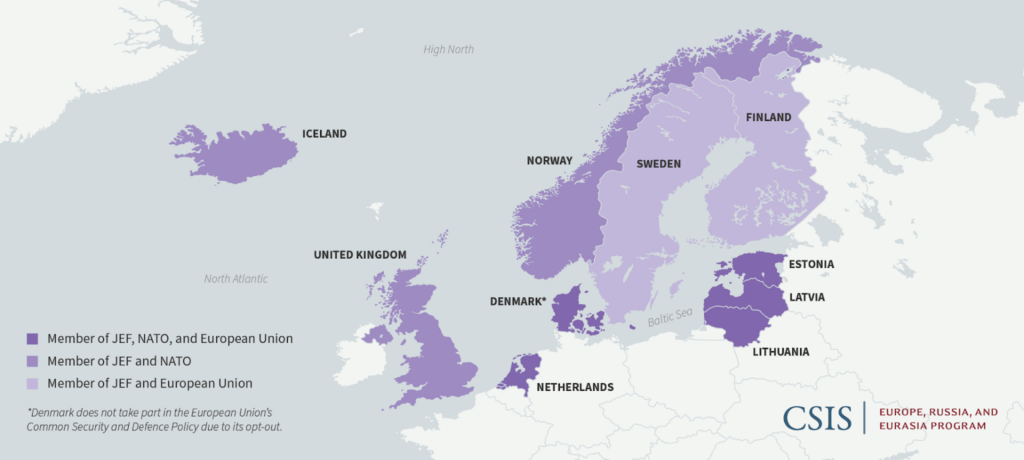
The JEF seeks to regain a military power and representation that NATO does not have in Northern Europe and the UK saw this possibility as the opportunity to materialize as a military pole and form new alliances and relations.
But it is not only a beneficial agreement for the strengthening of the United Kingdom, but for the other nations involved as well.
Because some are outside the agreement with NATO, the Expeditionary Force is a way to test their military forces to be on standby in case of a crisis and to establish a military cooperation base with other countries.
It is an action that aims to develop military capabilities among “allies with similar ideas” in Europe.
How the UK Joint Expeditionary Force can support NATO or the European Union in military operations in Europe
Apart from the issues of strengthening the Northern European countries, the JEF is a form of strengthening the European Union itself militarily.
There is a search for strategic autonomy of the European Union in several areas and the Joint Expeditionary Force and other groups “minilateral” such as AUKUS, Anglo-French Cooperation, a Nordic Defence Cooperation (NORDEFCO), comes as one of the actions that seek to balance the military forces within Europe:
[…] the purpose is to “help demonstrate European Allies’ willingness to do more for our common security and also improve the balance of the provision of capabilities between the United States and European Allies.”
CSIS
The JEF has a high capacity to act quickly, especially in hybrid wars. This has been a major focus of training, with an action to provide command and control to combat destabilizing activities at headquarters, who had 500 people coming from 10 nations for training.
Combining a diplomatic tradition with military action to deal with hybrid wars, the Joint Expeditionary Force can implement a multilateral military force below the threshold of war, i.e., without directly attacking. This gives the European Union more resources to be prepared in crisis situations without requiring unanimous approval from all 27 members.
As much as it seeks to occupy a position of military representation that cannot be executed by NATO, there is great scope for cooperation with the US, at the political-military, military-strategic and operational level, issues of military structure formation. A joint effort between NATO and the JEF would allow actions in different parts in crisis simultaneously.
The US can strengthen the JEF with ministerial exercises, training detachments, and strength design conferences that focus on rapid responses to aggression in Northern Europe, enabling growth in the Expeditionary Force’s action potential.
So there are contradictions within the role that this new international exploratory force will have, increasing European autonomy but being a gateway to a new growth of the United States in the region.
This strengthening in the UK’s cooperation with these nine allies brought a new actor to the European military defense conflicts, being already one of the resources ready to be employed if necessary in present conflict of Ukraine against Russia mainly by the nature of cooperation and rapid response that the JEF possesses.
What is the future trend of military and political alliances in Europe after the invasion of Ukraine by Russia
What the current conflict between Russia and Ukraine has demonstrated for the European Union and the world is the importance of establishing military political allies to seek a guarantee of their defense and national sovereignty.
Ukraine was a clear example of a country that was outside this dynamic of political-military support and protection, without international protection, which allowed a rapid invasion by Russia. Countries like Moldova in Europe and Georgia in the Caucasus, which also do not have major alliances that guarantee their security, will be entering the movement to seek greater support from other nations.
The JEF is one of the joint military strategies that are taking place and will increasingly occur in the strengthening of cooperation and integration alliances of the armed forces to discourage possible attacks by expansionist nations.
The more multinational alliances, the greater the security and international peace in general because it discourages the invasion of third countries by aggressive and expansionist nations, as these will know that there will be retribution by allied nations of the invaded country if this occurs.
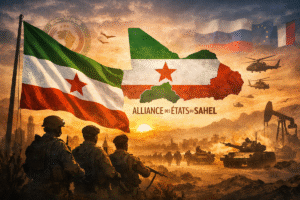

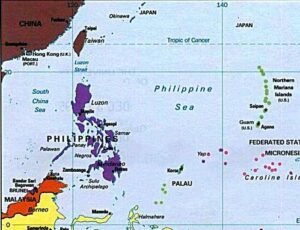
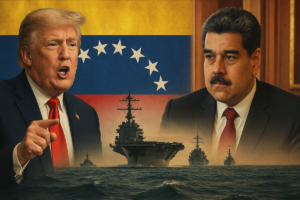
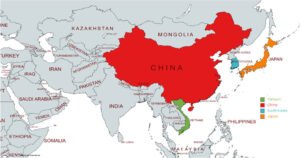

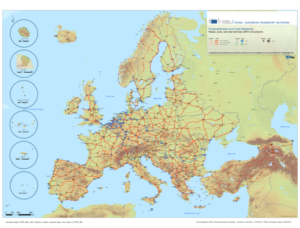





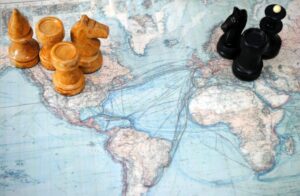

Be First to Comment